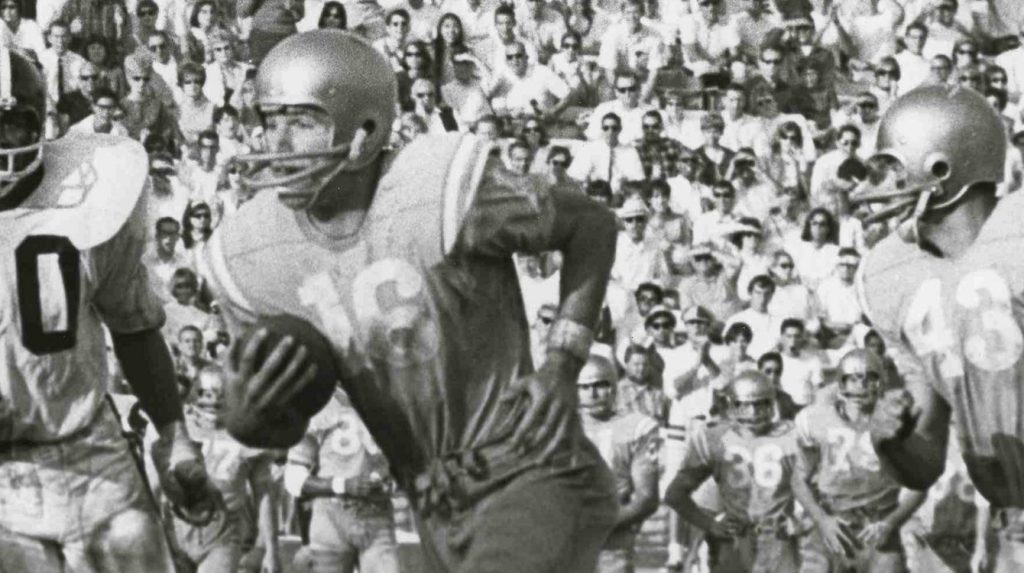
Catching up with Gary Beban

UCLA’s Gary Beban, the winner of the 1967 Heisman Trophy, will be honored on the 50th anniversary of his award at the annual Heisman Dinner Gala to be held this coming December 10th, the day after the 2017 winner is announced.
We had a chance to catch up briefly with Beban in the wake of last year’s ceremony to get his thoughts on his college days and his relationships with his fellow Heisman winners.
What’s the experience like coming back to New York for the Heisman ceremony?
Beban: “Returning is always fun because you get to see the other winners that over the years have become friends. For me, it’s been almost 50 years since I won. Over that time, you develop friendships, so it’s always wonderful to see them and learn what’s happened in their lives. It’s pretty exciting for me this year to sit next to Spurrier who’s on another career campaign, so it will be a lot of fun.”
Who are some of the guys you’ve become close to over the years? Any that surprised you?
Beban: “Some of these guys were my idols. Unfortunately, we lost John David Crow recently but since he was a 49er and I grew up in San Francisco, he was one. Steve (Spurrier), though I didn’t really know him back then even though we had the same quarterback coaches in college. Joe Bellino, we’ve gotten close. Pete Dawkins. Sooner or later you get to get pretty close to all of them after all these years.”
What about the younger Heisman winners?
Beban: “A lot of the younger ones are still playing. Those guys are racing around here too much and I can’t keep up. They’re still young enough to go fly in the streets so I’m not as close to them as the guys that I sit next to at the dinner.”
Have you had a chance to catch up with anyone lately who you haven’t talked to in a while?
Beban: “Mike Garrett is here this year and it’s been really inspirational for me to visit with him. He did a move on me in ’65 when we upset them, he came in our locker room and wished us the best against Michigan State in the Rose Bowl, which we had no hope in beating. Mel Farr and I said to each other “That was a brave thing to do.” And I said “I hope I can do that some day.” And yet in ’67 when we lost to O.J. (Simpson) and the Trojans, it turned out I couldn’t do what he did. So it’s been wonderful to get closer to him, too.”
Describe what it was like to play in that huge 1967 matchup with USC.
Beban: “It was a game over time that I’m glad we all got to play in. In those days, for us that was like the BCS championship game. It was us as No. 1 playing USC at No. 3 at the time, even though I think SC was the second best team in the country. So it’s not often in one’s career that one gets to play for No. 1. That’s what we had been shooting for in the four years we were at UCLA and, yeah, it was heartbreaking to lose by one point that day but, over time, we’ve all realized — and we talked about it at our Rose Bowl reunion — we were all glad we were able to play in those kind of games. Even though we lost, not many people can say they played in a game of that magnitude.”
How much did the Heisman Trophy hang over that senior year for you?
Beban: “The season was really about going for No. 1. We were seniors and that had been our goal. We had finished 4th and 5th in the previous years, so we knew we had a shot at it. The Heisman wasn’t even a thought for me. There was a lot of publicity around it, though nothing like what goes on now, but we all stayed away from the PR because we knew what our goal was.”
How did you find out about winning the Heisman?
Beban: “It really didn’t happen until after the SC game, which was bittersweet but I was sitting in my apartment and in those days you were told you were the winner and you came back to New York as the sole honoree, so to speak. J.D. Morgan, the UCLA athletic director back then, called me as I was in my apartment studying for finals. And he advised me that I should come into the chancellor’s office, not for punishment, just to come in to make a visit, because they had an announcement to make. So I knew what it was about. That’s the way it was done then versus the way it goes now.”
What was it like being a college athlete at UCLA in that era?
Beban: “We had this freshman kid on campus who was doing pretty well named Lew Alcindor. We had Rafer Johnson and C.K. Yang working out for the Olympics in the decathlon. We had Arthur Ashe who had just left, but he was always around. We had the No. 1 volleyball and water polo teams. There were great track and field squads on both ends of town. And then there was Tom Seaver playing baseball over at USC, not to mention their football team. It was really like the Athens of athletics with both UCLA and USC at the time. It was the best of the best. If you were a college sports fan in Los Angeles, I’m not sure it could ever be better than what it was during those three or four years.”




